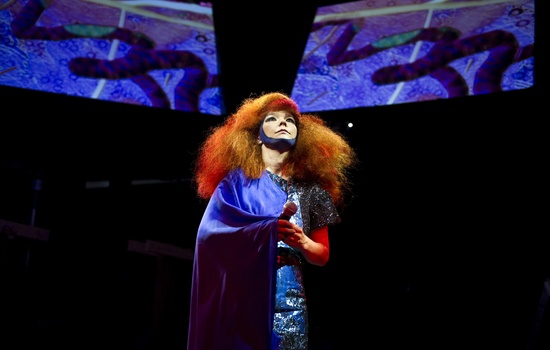To have been lucky enough to see not only the first, but the last of Bjork’s Biophilia shows, feels not only appropriately full-circle – given the all-encompassing, music-of-the-spheres nature of the beast – but inappropriately smug. My Cheshire cat grin is inappropriate, because for all its intricate interweaving and concentric concepts, Biophilia in performance is anything but smug. As the voiceover of silverback of the naturalists, David Attenborough, declares through the subtropically hot darkness of Ally Pally: "Sound, harnessed by human beings, delivered with generosity and emotion, is music."
Bjork is all about generosity and emotion; they are the vital sparks that animate this colossal creature she has sewn together from chunks of musicology, cosmology, biology and technology. It’s that spark that ensures that, now the dazzle and detail of the grand Biophilia concept has faded, these songs are re-revealing themselves as brilliantly subtle standalone things. I actually love the album a lot more now than when it came out.
Bjork herself, though, is ready to move on; in a recent interview on the anniversary of Debut, her manager Derek Birkett told me that she would now consider discussing Biophilia – her seventh album – to be something of the past, and was already migrating, magpie-like, onto new and shiny ideas.
So after two years of touring her musical-ecological-educational thing round the world, tonight is a loving kiss goodnight. Unfortunately (but also fortunately), that means it’s being filmed, with the attendant delays and repetitions of songs; minor annoyances, but they do tend to disrupt the flow of something that’s meant to be totally immersive.
In comparison to the show’s debut in Manchester two years ago, though, tonight feels less about the Biophilia concept, and more about the songs. ‘Thunderbolt’ doesn’t need the lightning flashes of the Tesla coil that descends above Bjork’s crew of Icelandic choirgirls, their blue and gold sequinned and shimmering cloaks evoking both in hue and wonderment the Blue Marble photograph of a distant earth taken by the crew of Apollo 17 (sorry – but Attenborough did just tell me to remember that I was a gateway between the universal and the microscopic). Its brooding, lolloping rhythms and Bjork’s dark fire-stealing frets ("Have I too often been craving miracles?") create a charged enough atmosphere on their own. ‘Crystalline”s brittle effusions, the Brownian motion of the excitable choirgirls choreographed into jumping crystal lattices, sparkle with poppy life. Even the songs less traditionally suited to a live setting such as the looming, ominous ‘Hollow’ and the creeping, organ-haunted ‘Dark Matter’ have a power to command, the girls standing in solemn huddles as Bjork intones strange, secret words into sonic spaces that suggest the mystery of bodily interiors, caverns or deep space darkness.
The versions of other albums’ songs on this tour have also been a revelation, particularly the jaw-droppingly beautiful take on Medulla‘s formerly glitchy ‘Mouth’s Cradle’, a breath-held delicate ‘Sonnets/Unrealities XI’ and a playful version of Debut‘s ‘One Day’, with Bjork just accompanied by Manu Delago on the hang, an instrument that’s sort of like a steel drum turned inside out. Tonight we’re also given a fantastic, Tesla-coil-assisted take on ‘Possibly Maybe’, taking that song’s woman-scorned anger to a cataclysmic sounding level that matches the volcanic ‘Mutual Core’ – "Mon petit vulcan… you’re eruptions and disasters.. how can you offer me love like that? My heart’s burned."
It’s those human translations of natural laws, the microscopic repetition of universal patterns – captured so well in the explosive lovers’ tiff of ‘Mutual Core’, and the plaint of a woman who feels she gives and gets little in return in ‘Sacrifice’ – that give these songs their lasting resonance. The latter is performed in the corner of the hall on the colossal pin-barrel harp known as the Sharpsichord – too heavy, Bjork tells us, to transport around the world, and so not wheeled out since Biophilia’s Manchester debut. "We’re all mushy and emotional," she acknowledges, preparing to draw the curtain.
Stuff sentimentalism and nostalgia, though; main driving energy of Biophilia is enthusiasm and wonderment, and so it feels fitting to close with two songs not on the album – a mad tectonic-plate-‘n’-bass take on ‘Nattura’, dedicated to Eyjafjallajokul, and ‘Declare Independence’, dedicated to Greenland and the Faroe Islands, both, as Iceland once was, subjects of the Danish kingdom. Bjork and her girls romp and stomp gleefully, bawling "Raise your flag! Higher, higher!" It’s a reminder that for all her art-gallery residencies, she’s still a punk brat at heart.
Which is good, because you can be sure that even after a project as all-encompassing as this, she’ll sweep the table clean with a crash and start again. Today the universe, tomorrow, up yours! I can’t wait.


